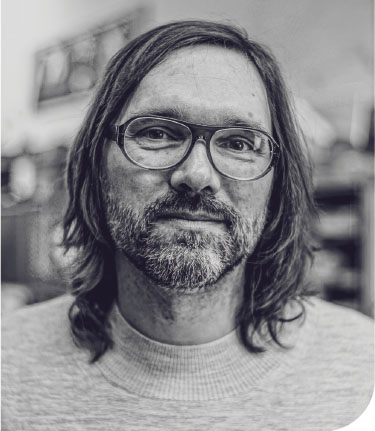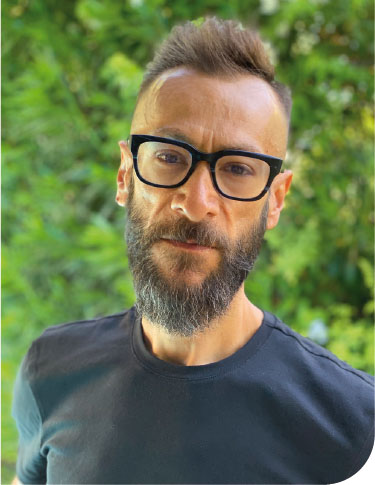
'One thing I wrestled with a lot as we worked on this was that teaching entrepreneurship – which already sounds a little dodgy because most entrepreneurs just get to it – was never meant to be an alternative to pursuing the mastery of your art.’ This is Michael Hendrix, joining us with a brilliantly colourful Zoom background from Boston, where he is assistant professor at Berklee and executive design director at global design and innovation consultancy IDEO.
Also on the call is co-author Panos Panay, senior vice president for global strategy and innovation at Berklee, as well as founder of the Berklee Institute for Creative Entrepreneurship (BerkleeICE) – one of the goals of which is to ‘prepare Berklee graduates to approach their careers entrepreneurially in the new music business’.
The project Hendrix is referring to is Two Beats Ahead: What Great Musical Minds Teach Us About Creativity and Innovation, a book published by Penguin in early April and conceived from the idea that the creative skills, mindsets and instincts possessed by musicians are the same traits that make a successful entrepreneur.
‘We realised that when we approach opportunities in our lives, whether it's starting a new business, or even just meeting new people at events, we are bringing a particular way of seeing the world to that – a musical mindset,’ says Hendrix. Through interviews with renowned musicians like Pharrell Williams, Imogen Heap, T Bone Burnett, Justin Timberlake and others, the book explores this idea, which, as the pair discovered when speaking to these artists, was less an epiphany and more something that had yet to be fully explored.
‘What we wanted to do was articulate that clearly so that other musicians could recognise that they had these traits and that they could transfer them to other pursuits they have,’ says Hendrix. On hearing this, some may brace themselves for the possibility that this is a variation of ‘children should do music because it improves their maths’, but Hendrix goes on: ‘We didn't want students to think, “Oh, I can't make it as a musician, I'll just become an entrepreneur and create a software start-up.” That was not the intention – the intention was to say that you have even more to offer the world, so continue to be masterful at your art, pursue virtuosity, and recognise that those things that make you excellent in your music also make you excellent in other ways of showing up in the world.’

Michael Hendrix
Musicians are not the sole target readership of the book, though: ‘It's also for people who may not call themselves musicians – we hope the book will help them start to recognise some of these characteristics in themselves as well. We do believe they're human traits ultimately, it's just that musicians have a trial by fire, generally, in their careers and develop these faster than most,’ adds Hendrix.
Panay continues: ‘I truly believe that creativity is fundamentally human. It's just that as we go through life, it's obscured by layers and layers of gunk.’ Niftily reminding us that he is joining us from Cyprus, where he grew up, Panay adds: ‘Everybody's weather is sunny once you go above the clouds.’
Uncovering creativity
‘Being at the world's largest contemporary music institution,’ says Panay, ‘I feel it's important that as educators, we assert the importance of a music education so that it's role is not just about teaching young people how to play or perform music, but being intentional in cultivating these very intuitive mindsets, because they are truly applicable in the lifelong journey of a person.’
‘I believe that part of music pedagogy is helping people uncover their own creativity, but then also teaching them about the muscle you're developing – whether the muscle of listening, collaborating, synthesising information, being able to take disparate things and make them something totally different. This is something that, if we're intentional in our approach as educators, can elevate the very value of the music education that we want to preserve.’
At a glance, it may not be immediately clear how these ideas about music and creativity translate into a music educator's daily practice, particularly with younger age groups. But Panay says: ‘Learning starts the minute you're born. Those ages are so critical – it's the time when you develop the habits that later make a difference between being a responsible productive citizen and a content human being, or something other than that. This is a framework that can be applied to any age – I don't think creativity is anything “advanced”.’
Hendrix adds: ‘Even for kids to start to recognise how we understand each other through song, through instruments, through being inspired by one another and blending these ideas together – it's a kind of remixing and synthesising. You look at the state of global politics: we need people to start to understand these ideas. All of that comes from music.’

Panos Panay
Main nutritional meal
As their approach seems to bridge the ‘gap’ between the two, I'm interested to hear the authors’ views on the STEM vs arts subjects dialectic, likely played out in UK schools to an exaggerated extent due to funding constraints and jostles for coveted lesson time. Panay says: ‘I don't feel that we've always done as good of a job as we could as music educators to say, "Well coding is important, math is important, science is important, engineering is important, but this creative education in fact helps people take these other disciplines, remix them, synthesise them, blend them and create something totally different and innovative". Because to solve some of humanity's greatest challenges, actually we need creativity more so than just these other disciplines living on their own.’
Arguing against the all too familiar narrative of music education as a ‘nice dessert’ with other ‘more important’ subjects as the main course, Panay says: ‘It's the other way around. Music is the main nutritional meal that makes the difference between a healthy, fulfilling life and one that's not. I feel that it's our own ethical and moral responsibility to assert the value of music education precisely because we owe this to younger generations.’
Hendrix goes on to discuss how the ‘blending together’ of technologies – with tools such as Logic, Audacity, Photoshop, Microsoft ad Google Docs starting to have similar interfaces – makes musical exploration more accessible at a younger age, something that is referenced in Two Beats Ahead. ‘I think the challenge for all of us in music or design, or whatever it is, is to be open to that, to surrender to it – not to try to silo our art as more important, developed or civil than another art. They're all coming together because of the tools and that's great for generations ahead – it's more creativity unlocked. In writing the book I found this affirming; I hope other people find it affirming and not scary.’
Looking ahead
With innovation one of its core topics, the book is forward-thinking by nature, but the impact of the pandemic on music education at a global music college like Berklee is clearly going to be significantly different to the experiences of teachers in UK classrooms and hubs. Our conversation took place before the new MMC was announced, so I was unable to raise this, but Panay shares his thoughts on the role of a music teacher in any context: ‘It starts by asserting the value of music education in young people as a means of not just cultivating performers, composers or arrangers, but also cultivating social and civic responsibility, leadership, confidence, empathy, creativity, problem-solving, because these are the skills, frankly, that we need in this world post-pandemic.
‘We must recognise our own value, but we also have to speak up and position this as something that goes beyond just the abstract “value of the arts”. No, this is about our own humanity more than it is about “the arts”. The arts just happen to be an expression of humanity, or maybe humanity is an expression of art for all I care.’
Hendrix, who acknowledges that he is speaking less from the perspective of a music educator, but more as someone who has watched his children go through music education in school, says: ‘You've already been forced to improvise throughout the last year, we all have, so I think my challenge to everybody coming out of this pandemic is: don't stop. This disruption [to education] may have been inconvenient, but I think it does help us pause and see that there are other ways of bringing kids into this world that we're talking about.’
Two Beats Ahead can be bought online at www.penguin.co.uk








